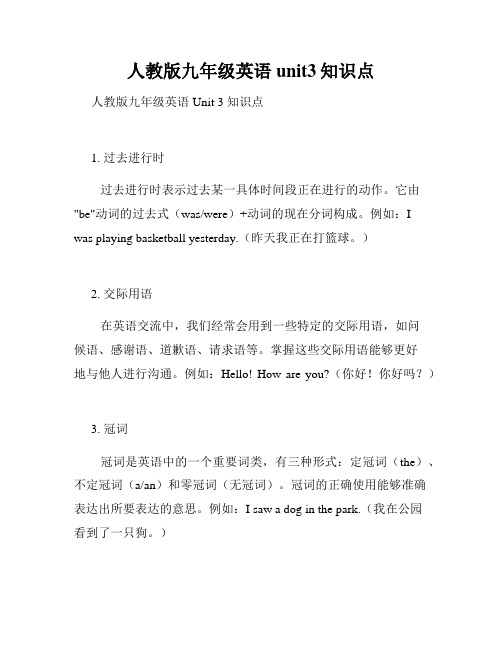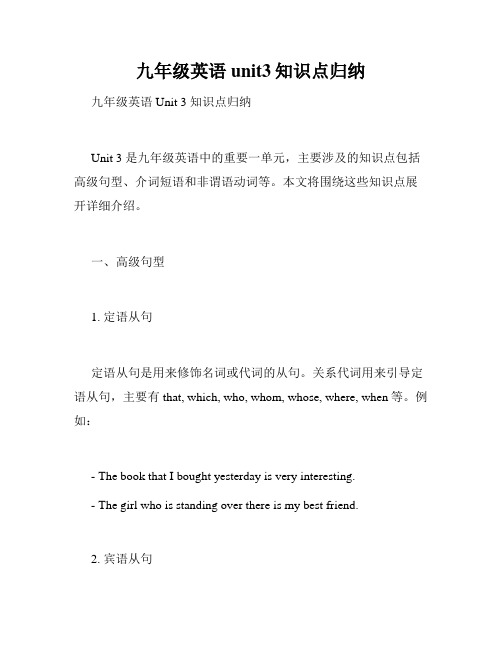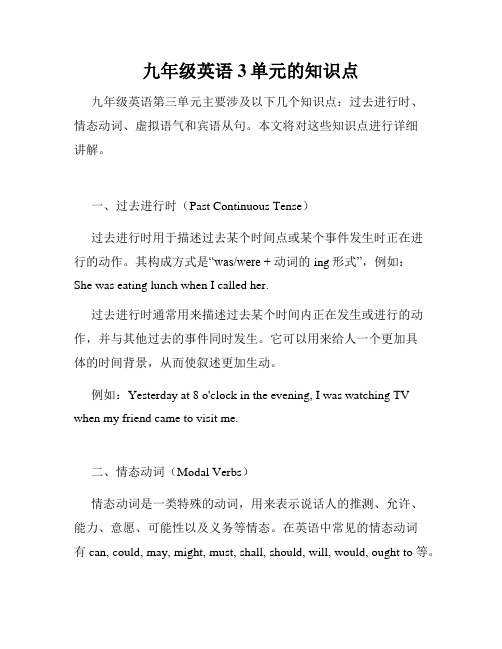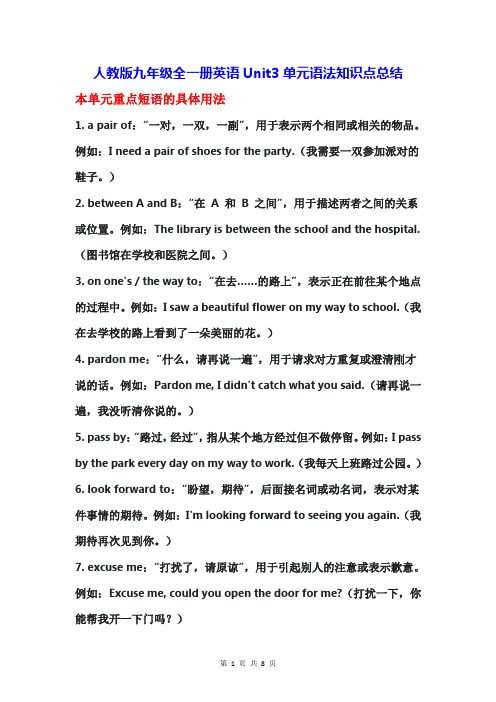九年级英语第三单元知识点完整版
九年级unit 3知识点总结

九年级unit 3知识点总结Unit 3 知识点总结Unit 3 是九年级英语课程中的一个重要单元,本文将对该单元的知识点进行总结。
内容包括:名词性从句、情态动词、宾语从句、反意疑问句以及其他相关语法知识和常用短语。
一、名词性从句名词性从句是句子中用作名词的从句,可以充当主语、宾语、表语和同位语。
常见的引导词有:that, whether, if, who, whom, whose, what, which等。
名词性从句往往由以下句式构成:1. 主语从句:What he said is true.2. 宾语从句:I am not sure if/whether he will come.3. 表语从句:The question is who will go with us.4. 同位语从句:The news that he passed the exam is exciting.二、情态动词情态动词用于表示说话人对某种行为或状态的态度、意愿、能力等。
常见的情态动词有:can, could, may, might, must, shall, should, will, would等。
1. 表示能力和允许:can, could, may, might- They can swim very well.- Could I borrow your pen, please?- May I go to the restroom?2. 表示推测和猜测:must, may, might- He must be at home. I saw his car outside.- It may rain tomorrow. Take an umbrella with you.- He might not have heard the news yet.3. 表示义务和建议:must, should, ought to- You must finish your homework before going out to play.- You should/ought to apologize to him for your mistake.4. 表示将来:shall, will- I shall/will come to see you tomorrow.三、宾语从句宾语从句在句子中作为动词的宾语。
人教版九年级英语unit3知识点

人教版九年级英语unit3知识点人教版九年级英语Unit 3 知识点1. 过去进行时过去进行时表示过去某一具体时间段正在进行的动作。
它由"be"动词的过去式(was/were)+动词的现在分词构成。
例如:I was playing basketball yesterday.(昨天我正在打篮球。
)2. 交际用语在英语交流中,我们经常会用到一些特定的交际用语,如问候语、感谢语、道歉语、请求语等。
掌握这些交际用语能够更好地与他人进行沟通。
例如:Hello! How are you?(你好!你好吗?)3. 冠词冠词是英语中的一个重要词类,有三种形式:定冠词(the)、不定冠词(a/an)和零冠词(无冠词)。
冠词的正确使用能够准确表达出所要表达的意思。
例如:I saw a dog in the park.(我在公园看到了一只狗。
)4. 询问和描述过去经历的表达方式当我们想询问或描述过去的经历时,可以使用一些特定的表达方式。
例如:Have you ever been to Beijing?(你去过北京吗?)Yes, I have been to Beijing before.(是的,我之前去过北京。
)5. 句型转换在英语学习中,我们常常需要进行句型转换,以提高我们的语言运用能力。
例如:I will go to the cinema.(我将去电影院。
)→Will you go to the cinema?(你将去电影院吗?)6. 非谓语动词非谓语动词是一种特殊的动词形式,常见的有不定式、动名词和动词-ing形式。
非谓语动词在句子中可以作主语、宾语、表语或状语等。
例如:Swimming is my favorite sport.(游泳是我最喜欢的运动。
)7. 时态的用法时态是英语中一个重要的语法点,不同的时态可以表示不同的动作发生时间。
如一般现在时表示目前的状态或经常的动作,现在进行时表示正在进行的动作等。
九年级英语unit3知识点归纳

九年级英语unit3知识点归纳九年级英语Unit 3 知识点归纳Unit 3 是九年级英语中的重要一单元,主要涉及的知识点包括高级句型、介词短语和非谓语动词等。
本文将围绕这些知识点展开详细介绍。
一、高级句型1. 定语从句定语从句是用来修饰名词或代词的从句。
关系代词用来引导定语从句,主要有that, which, who, whom, whose, where, when等。
例如:- The book that I bought yesterday is very interesting.- The girl who is standing over there is my best friend.2. 宾语从句宾语从句是在主句中作为宾语的从句。
常用的引导词有that, whether, if等。
例如:- I don't know if it will rain tomorrow.- She asked me whether I had finished my homework.3. 状语从句状语从句是用来修饰主句的副词从句,常用的引导词有when, while, after, before, since, until等。
例如:- He always listens to music while he is doing his homework.- I will call you back as soon as I finish my work.二、介词短语介词短语在句中起着修饰或者指示的作用,可以表达时间、地点、原因、方式等。
常见的介词短语有at, in, on, of, for, with, by等。
例如:- I will meet you at the park tomorrow.- She is good at playing the piano.三、非谓语动词非谓语动词是指在句子中作为非主谓部分的动词形式,包括动词不定式、动名词和现在分词。
九年级英语3单元的知识点

九年级英语3单元的知识点九年级英语第三单元主要涉及以下几个知识点:过去进行时、情态动词、虚拟语气和宾语从句。
本文将对这些知识点进行详细讲解。
一、过去进行时(Past Continuous Tense)过去进行时用于描述过去某个时间点或某个事件发生时正在进行的动作。
其构成方式是“was/were + 动词的ing形式”,例如:She was eating lunch when I called her.过去进行时通常用来描述过去某个时间内正在发生或进行的动作,并与其他过去的事件同时发生。
它可以用来给人一个更加具体的时间背景,从而使叙述更加生动。
例如:Yesterday at 8 o'clock in the evening, I was watching TV when my friend came to visit me.二、情态动词(Modal Verbs)情态动词是一类特殊的动词,用来表示说话人的推测、允许、能力、意愿、可能性以及义务等情态。
在英语中常见的情态动词有can, could, may, might, must, shall, should, will, would, ought to等。
情态动词的用法多种多样,根据不同的语境有不同的含义和用法。
例如,can表示能力,may表示允许,must表示必须等。
情态动词在句子中通常与动词原形搭配使用。
例如:You must finish your homework before going out to play.表示“你必须在出去玩之前完成作业”。
三、虚拟语气(Subjunctive Mood)虚拟语气用于表示与事实相反、假设、愿望、建议等非真实情况。
主要包括虚拟条件句、虚拟愿望句、虚拟建议句等。
虚拟语气的构成方式多样,根据不同的情况采用不同的形式。
例如,如果我们想表达对于过去的事实的惋惜或遗憾,可以使用“should have + 过去分词”的形式。
九年级英语第三单元知识点

九年级英语第三单元知识点九年级英语第三单元知识点概述一、时态应用1. 一般过去时:用于描述过去发生的动作或状态。
- 例句:He visited the museum last Saturday.- 构成:主语 + past tense of the verb2. 过去进行时:用于描述过去某一特定时间正在进行的动作。
- 例句:She was reading a book when her friend called her. - 构成:主语 + was/were + present participle of the verb3. 过去完成时:用于表示在过去某一时间点之前已经完成的动作。
- 例句:They had finished their homework before the movie started.- 构成:主语 + had + past participle of the verb二、词汇与短语1. 旅行相关词汇- travel, journey, trip, destination, itinerary- book a flight, check in, passport, visa, souvenir2. 描述经历的短语- have been to, have gone to, be interested in, try out3. 表达可能性和推测的短语- It is possible that…, It might be that…, It is probable that…- I think/believe/suppose th at…三、语法点1. 宾语从句- 用于表达一个完整的想法或信息,作为句子的宾语。
- 例句:I don’t know where he has gone.- 注意:宾语从句通常使用陈述语序。
2. 定语从句- 用于修饰名词或代词,提供额外信息。
- 例句:The man who lives next door is a doctor.- 注意:关系代词(who, which, that)和关系副词(where, when, why)用于引导定语从句。
九年级英语第三单元重要知识点归纳(整理打印版)

Unit3 Could you please tell me where the restrooms are?【短语归纳】1.get some money 取钱2.save money 省钱、存钱3.get some information获取一些信息4.get a dictionary买字典5.buy some stamps 买一些邮票6.post/ mail a letter 寄信7. a pair of shoes 一双鞋,(做主语时,谓语动词用单数)8.go along沿着go east along 沿着...朝东走9.go straight 向前直走10.go past = pass by= pass路过; 经过11.on one’s left / right 在某人的左边/ 右边12.turn left / right on == take a left / right on 在某处向左/右转13.take the elevator / escalator to the … floor.乘电梯/自动扶梯到…楼14.get sb. sth.=get sth. for sb.给某人拿来某物give sb. sth.= give sth. for sb. 给某人某物buy sb. sth.=buy sth. for sb. 给某人买某物buy sth. from 从某处买某物15.be excited to do sth 兴奋地去做某事16.start with 从…开始17.mean to do sth 打算做某事mean doing sth 意味着……18.rush into 冲进; 匆忙进入rush out 仓促地跑出rush off 仓促跑掉rush to (使某人)急速去…19.at first 起先, 首先; 最初20.on one’s way to. . . 在某人去……的途中21.suggest doing sth. 建议做某事22.down the street 顺着这条街23.at the end of the road 在这条路的尽头24.tell sb. to do sth告诉某人做某事25.ask about询问; 打听ask for请求; 要求; 询问26.the corner of. .. ……的角落on /at the corner of 在拐角处(在建筑物外部)in the corner of 在角落里(在建筑物内部)27.what kind什么种类28.be convenient for /to sb. 对某人来说方便29.kind of 种类;有点儿30.based on 以…为基础46. be sure to do sth 一定做某事47. become better at 提高,改进31.each other 彼此, 互相48. on the third floor 在三楼32.such as比如; 例如33.parking lot 停车场; 停车区park one’s car 停车34.less polite 更不礼貌35.make requests 提出要求、请求request sth.(from sb.)向某人请求…request sb. to do sth.请求某人做某事36.ask for directions 问路;请教, 请求指导37.in different situations 在不同的情况下38.it is all right = that’s all tight 没关系municate with sb 和某人交流40.get some information 获取信息41.look forward to doing sth 期待做某事42.in a rush to do sth 匆忙地做某事43.on time 准时44.be convenient to do sth 做某事很方便【单元知识点】1.辨析:spend, pay, cost, take 花费①sb. spend +时间/钱+ (in) doing sth. 某人在做某事上花费时间/钱sb. spend +时间/钱+on sth. 某人在某事物上花费时间/钱(spend的主语是人)②sb. pay +钱+ for sth 某人在某物上花费多少钱(pay的主语是人)③sth. cost sb +钱某物花费某人多少钱(cost的主语是物)④It takes sb +时间/钱+ to do sth 花费某人多少时间/金钱去做某事(It 做形式主语)2.辨析besides / except①besides 除....之外(还有)其前常有other, another, any other, a fewI have a few good friends besides you.除了你之外,我还有几个好朋友。
九年级上册英语第三单元知识点总结

九年级上册英语第三单元知识点总结一、重点单词。
1. restroom.- 名词,意为“(美)洗手间;公共厕所”。
例如:I need to find a restroom.(我需要找个洗手间。
)2. stamp.- 名词,“邮票;印章”;也可作动词,“跺脚;盖章”。
- 作名词:He collects stamps.(他集邮。
)- 作动词:She stamped her foot angrily.(她生气地跺了跺脚。
)3. bookstore.- 名词,“书店”。
例如:There is a big bookstore near my school.(我学校附近有一家大书店。
)4. beside.- 介词,“在……旁边;在……附近”。
例如:The boy is standing besidehis mother.(那个男孩站在他妈妈旁边。
)5. postcard.- 名词,“明信片”。
例如:I sent a postcard to my friend.(我给我的朋友寄了一张明信片。
)6. pardon.- 可作名词,“原谅;宽恕;对不起”;也可作动词,“原谅;赦免”。
- 作名词:I beg your pardon.(请再说一遍。
)- 作动词:Pardon me for being late.(原谅我迟到了。
)7. washroom.- 名词,“洗手间;厕所”(尤指公共建筑物内的)。
例如:The washroom is on the second floor.(洗手间在二楼。
)8. bathroom.- 名词,“浴室;洗手间”。
例如:There is a bathtub in the bathroom.(浴室里有一个浴缸。
)9. normal.- 形容词,“正常的;一般的”。
例如:It's normal to feel tired after a long day.(漫长的一天后感到疲倦是正常的。
人教版九年级全一册英语Unit3单元语法知识点总结

人教版九年级全一册英语Unit3单元语法知识点总结本单元重点短语的具体用法1. a pair of:“一对,一双,一副”,用于表示两个相同或相关的物品。
例如:I need a pair of shoes for the party.(我需要一双参加派对的鞋子。
)2. between A and B:“在A 和B 之间”,用于描述两者之间的关系或位置。
例如:The library is between the school and the hospital.(图书馆在学校和医院之间。
)3. on one's / the way to:“在去……的路上”,表示正在前往某个地点的过程中。
例如:I saw a beautiful flower on my way to school.(我在去学校的路上看到了一朵美丽的花。
)4. pardon me:“什么,请再说一遍”,用于请求对方重复或澄清刚才说的话。
例如:Pardon me, I didn't catch what you said.(请再说一遍,我没听清你说的。
)5. pass by:“路过,经过”,指从某个地方经过但不做停留。
例如:I pass by the park every day on my way to work.(我每天上班路过公园。
)6. look forward to:“盼望,期待”,后面接名词或动名词,表示对某件事情的期待。
例如:I'm looking forward to seeing you again.(我期待再次见到你。
)7. excuse me:“打扰了,请原谅”,用于引起别人的注意或表示歉意。
例如:Excuse me, could you open the door for me?(打扰一下,你能帮我开一下门吗?)8. get some information about:“获取有关……的一些信息”,用于表示获取关于某个主题的信息。
- 1、下载文档前请自行甄别文档内容的完整性,平台不提供额外的编辑、内容补充、找答案等附加服务。
- 2、"仅部分预览"的文档,不可在线预览部分如存在完整性等问题,可反馈申请退款(可完整预览的文档不适用该条件!)。
- 3、如文档侵犯您的权益,请联系客服反馈,我们会尽快为您处理(人工客服工作时间:9:00-18:30)。
Unit3 Teenagers should be allowed to choose their own clothes.熟记以下短语:1. be allowed to do sth 被允许干…allow sb to do sth 允许某人干…allow doing sth 允许干…2. sixteen-year-olds = sixteen-year-old boys and girls 16岁的孩子3. part-time jobs 兼职工作4. a driver’s license 驾照5. on weekends 在周末6. at that age 在那个年龄段7. on school nights 在上学期间的每个晚上8. stay up 熬夜9. clean up (相当与及物动词) 清扫10. fail (in) a test 考试不及格11. take the test 参加考试12. the other day 前几天13. all my classmates 我所有的同学14. concentrate on 全神贯注于15. be good for 对…有益16. in groups 成群的,按组的17. get noisy 吵闹(系表结构)18. learn from 向某人学习19. at present 目前,现在20. have an opportunity to do sth 有做…的机会21.English-English dictionary 英英词典22. at least 至少23.eight hours’ sleep a night 每晚8小时的睡眠24. an old people’s home 敬老院25. take time to do sth 花费时间干…26. primary schools 小学27. have…off 放假,休息28. reply to 回答,答复29. get in the way of 妨碍30. a professional athlete 职业运动员31. achieve one’s dreams 实现梦想32. think about 思考,考虑33. in the end 最后,终于34. be serious about 对…热忠/极感兴趣35. spend…on + n. spend …(in) + v-ing 在…上花费时间/金钱36. care about 关心,担心,在乎37. agree with 同意…1.语态:①英语有两种语态:主动语态和补动语态主动语态表示是动作的执行者被动语态表示主语是动作的承受者Catseat fish. (主动语态)猫吃鱼。
Fish is eaten by cats. (被动语态) 鱼被猫吃。
②被动语态的构成由“助动词be +及物动词的过去分词”构成当我们不知道谁是动作的执行者,或者没有必要指出谁是动作的执行者,或者只需强调动作的承受者时,要用被动语态。
固定搭配、词语辨析:2. Teenagers should be allowed to choose their own clothes.allow sb. to do sth. 允许某人做某事(主动语态)如:Mother allows me to watch TV every night. 妈妈允许我每晚看电视。
be allowed to do sth. 被允许做某事(被动语态)如:Lily is allowed to go to Qinzhou. 莉莉被允许去钦州。
3. Sixteen-year-olds should be allowed to get their ears pierced.get their ears pierced 穿耳洞Sixteen-year-olds=sixteen-year-old teenagers让/使(别人)做某事 get sth. done (过去分词)have sth. done (过去分词)如:I get my car mended. = I have my car mended. 我让别人修好我的车Practice1. Do you often allow ______ until 11:00 pm?A to stay upB stay upC staying upD and stay up2. Do you think we should be allowed ______our own decisions?A to makeB makingC makeD to making3. It _____ to drive after drinking wine.A is allowedB is not allowedC is madeD is welcomed写出下列句子同义句1.Sixteen-year-old teenagers can work at places like Target and Walmart.________ can work at places like Target and Walmart.2.Why not have your hair cut?Why not ______ your hair _____?4. They aren’t serious enough.enough 足够形容词+enough 如:beautiful enough足够漂亮enough+名词如:enough food 足够食物enough to 足够…去做…如:I have enough money to go to Beijing. 我有足够的钱去北京。
She is old enough to go to school. 她够大去读书了。
5 He should stop wearing that silly earring.. stop doing sth. 停止做某事Please stop speaking.请停止说话。
stop to do sth. 停止下来去做其他事Please stop to speak. 请停下来去说话。
Practice:用含enough的短语完成句子1.I have ______ _______ ______ (足够的位置提供给)everyong.2.The boy isn’t _____ ______ ______ (年龄不够) go to school。
3.Three pears are ______ ______ (够多) us to last half an hour.用括号内所给词的适当形式填空。
1.It’s time for lunch. Let’s stop _____ (have) a rest.2.As soon as the teacher came in, the students stopped ______ (talk).3.Stop ______ laugh and listen to me.4.Nothing can _______ (stop) the wheel of the history from _____(go) forward.8. 倒装句:----We have a lot of rules at my house.----So do we.由so+助动词(be/do/will/have)/情态动词+主语意为:…也是一样She is a student. So am I.她是一个学生,我也是。
She went to school just now. So did I . 她刚才去学校了,我也是She has finished the work. So have I . 她已经完成了工作,我也完成了。
She will go to school. So will he.她将去学校,他也是。
10. Find someone who is allowed to stay up until 11:00pmStay up 不睡觉,熬夜Until 用于肯定句中,谓语动词要用延续性动词,表示这个动作一致延续到until发生的时间为止Until 用在否定句中,谓语动词要用短暂性动词,表示这一动作从until所表示的时间开始。
Till 和until 可以互换Practice1.If he goes to the party,______A so she willB so will sheC so does sheD so she does2.I have never been to America._____ my sister.A Neither hasB Neither doesC Has neitherD Neither was3.----David has made great progress recently.----______ and______.A so he has, so you haveB So he has, so do youC So he has, so have youD So has he , so you have翻译句子1.我以前熬夜在电视上看体育节目I _____ ______ _______ ______ ______ sports games on TV.2 . 我要在这里等她来为止。
I’ll w aiting here _____ _____ ______.3他们谈话一直到深夜一点。
They ______ ______ _______ they ______ _____ the work.4.我们老师不允许我们熬夜太晚。
Our teacher ______ _______ ______ ______ _______ _____ too late.12. 程度副词:always总是usually经常sometimes有时never从不如:I am always/usually/sometimes/never late for school.我总是/经常/有时/从不上学迟到。
13. Do you ever worry that you’ll fail a test?Worry 作动词,意味“担心,着急。
”Worry about sb./sth.Be worried about sb./sth 为某人/某物担心/着急Worry that+ 从句Do you ever get to school late? Yes, I do. /No, I don’t.Have you ever got to school late? Yes, I have. /No, I haven’t.Parents should not be too strict with teenagers.be strict with sb. 对某人严厉如:Mother is strict with her son. 妈妈对她的儿子很严厉。
